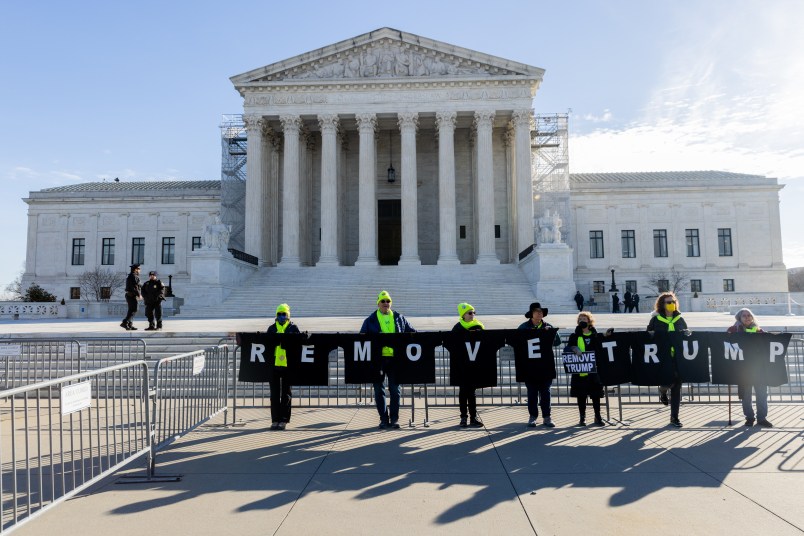As the Supreme Court heard arguments Thursday on disqualifying Donald Trump, justices kept returning to one issue: the potential for inconsistency between how states run their elections.
To the emerging view on the court, letting Colorado disqualify Trump opened the doors to a potentially nightmarish scenario which Trump’s attorneys bandied about in their pre-argument filings: that the country would be confronted with 50 different decisions on disqualification, fifty 50 elections with 50 different rules to elect a single president.
Chief Justice John Roberts summed up the court’s anxieties at one point in a hypothetical, suggesting that allowing Colorado to disqualify Trump would be a decision that cascades into chaos, with states disqualifying candidates from whichever party their top officials were opposed. The decisions about who was allowed on the ballot in the swing states that often determine the president would be particularly momentous.
“It would come down to a handful of states deciding an election,” Roberts thundered at one point. “That’s a pretty daunting consequence.”
All that ignores a key principle laid out by Shannon Stevenson, attorney for the Colorado secretary of state: 50 different elections is how the system was designed. As she put it, it’s the “messiness of federalism.”
Differences in how states conduct elections for federal office are a regular part of how they’re run, she told the justices at the end of oral arguments.
“There are differences in who is on different states’ ballots,” she said. “We are here seeking nationwide legal guidance. States have processes, we need to let that play out. If different states do it differently, that’s fine.”
Throughout the arguments, justices across partisan and ideological lines expressed the concern that inconsistency between the states in determining who is disqualified loomed as a threat to the finding that Section Three of the 14th Amendment bars Trump from running.
At one point, Justice Elena Kagan called the idea “extraordinary.”
“Why should a single state have the ability to make this determination not just for their own state but for the nation?” she said.
At another point, Justice Ketanji Brown Jackson raised her concern with “uniformity” in elections across the country.
Why, she asked, would the founders have “designed a system that could result in interim disuniformity in this way, where we have elections pending and different states suddenly saying, ‘You are eligible, you’re not.’”
She used that as a platform to take the discussion in a somewhat different direction, asking later why “President” doesn’t appear explicitly in the list of individuals that the Disqualification Clause bars from taking office.
The question of inconsistency has arisen in several of the states which have seen efforts to disqualify Trump due to his involvement in the Jan. 6 insurrection.
Ron Fein, legal director for Free Speech for People, a group that’s sought unsuccessfully to disqualify Trump in several states, told TPM that it was “disingenuous” to suggest that 50 states making fifty different decision was a new development.
“Candidates appear on some state ballots and not on others all the time,” he said. “Kanye West was on some in 2020, he wasn’t on all 50.”
Another appellate attorney argued to TPM that the same people who had spent years advancing the independent state legislature theory were now advocating the opposite: that states lack the power to decide who to disqualify.
At another point, Justices Amy Coney Barrett and Samuel Alito took the same question around uniformity and applied it to what process the different states might use to determine whether a candidate is disqualified. One state might have a certain hearsay standard, Barrett suggested; Alito asked at another point whether the House Jan. 6 Committee report would be admissible in another.
Throughout, Trump attorney Jonathan Mitchell indulged the anxiety.
“They could reach a conclusion that the January 6 report is hearsay,” he suggested.
At the end, it was only Stevenson, attorney for the Colorado Secretary of State, who offered a clear and straightforward defense of each state making this determination on its own.
“We need faith in the system,” she told Justice Alito at one point, before suggesting that the ball, at the end of the day, is in the Supreme Court on deciding whether to disqualify Trump.
“Ultimately it’s up to this court to review,” she said.







Oh sweet summer child, you’ve come to the wrong place.
States certainly can’t exclude a presidential candidate from the ballot.
Geeze louise, the Jan Six committee found the Defendant had organized and encouraged an insurrection. The Colorado Supreme Court looked over the evidence and came to the same conclusion.
Only the Supreme Court seems to believe it’s impossible to tell what this “insurrection” thingie is. It could be anything! Like “Vote Blue!”
Assertions of the wisdom of Federalism have become like political cross dressing for justices.
Did none of the lawyers push back on the idea about 50 different results? Does this mean 50 different insurrectionists? This is judges trying to avoid an issue: there WAS an insurrection. Trump led it. He CAN be disqualified.